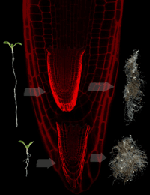Please also check https://www.unil.ch/hardtkelab for more elaborate information on our lab!
Summary statement
Unlike most animals, plants are not motile and therefore have to cope with their immediate environment throughout their life cycle. Thus, evolution has endowed plants with a remarkable range of developmental plasticity. For instance, plant cells possess an amazing regeneration potential that enables the formation of a whole plant from a single somatic cell, bypassing the requirement for a fertilization event and zygote formation. This totipotency of plant cells has not been found in animals. Another central feature of plant development is the post-embryonic formation of the plant body. In animals, all organs are formed during embryogenesis and elaborated during the juvenile stage. By contrast, plant embryogenesis results in the formation of a miniature plant, the seedling, which possesses discrete areas of stem cells. These stem cells will form the majority of the plant organs post-embryonically, in a reiterative fashion and in response to environmental stimuli. Ultimately, the stem cells have the potential to form any organ and any cell type found in the adult organism. This build up of organs continues until the plant dies and can last hundreds of years in long-lived plants, like certain trees. Thus the control of plant growth and the elaboration of plant form are central to plant development.
Our research revolves around the genetic control of plant growth and development, and the underlying molecular mechanisms. We focus on genes that are responsible for modifying quantitative aspects of plant growth and morphology, which possibly could also have a role in the evolution of plant form. We isolate such genes by exploiting the natural genetic variation present in Arabidopsis thaliana wild isolates. Arabidopsis is also our model organism of choice to characterize the cell biological and biochemical functions of the respective proteins. We are particularly interested in genes that determine the growth rate of organs. These include genes that determine root system architecture as well as genes that determine the rate of secondary growth, i.e. the thickening of stems. Once isolated, we test the activity of such genes in other systems, for example tobacco or tomato. Our work has also some applied edge, since the sustainable production of plant biomass is a topic of increasing interest in light of the pressure posed on agricultural productivity by an ever-increasing world population, or in light of novel industrial uses of plants, for example the production of biofuels.


